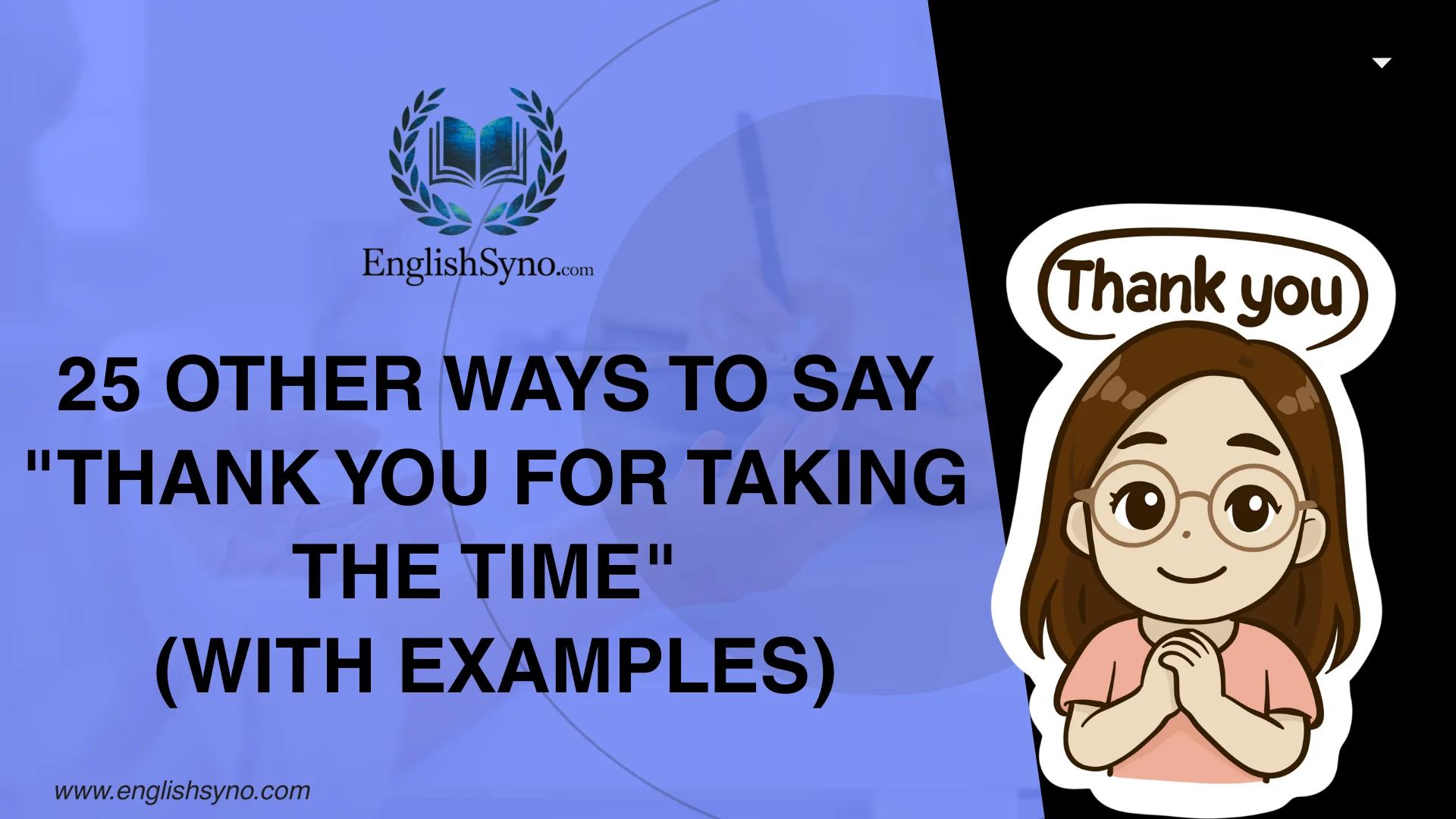In today’s busy world, it’s vital to communicate gratitude to others in a thoughtful way. Thank you for taking the time to express appreciation shows respect, strengthens professional relationships, and builds a more positive environment. Acknowledging someone’s efforts with polite thank-you remarks opens the door to future support and better connections.
There are 25 ways to say thank you, covering a wide range of situations, including interview contexts and personal or professional instances. Recognize someone’s contributions by sending a message, note, or card, following guides, examples, and key takeaways, which strengthens communication, builds trust with companies or job contacts, and creates a respectful, thoughtful, positive environment for part-time, full-time, or remote work, especially when urgently hiring or viewing opportunities, while always considering another person’s feelings to make the expression genuine and impactful.
What Does “thank you for taking the time” Mean?
Saying “thank you for taking the time” shows appreciation for someone’s efforts, attention, and commitment. It conveys respect and acknowledgment of the other person’s time, making them feel valued.
Best Use: When someone has made an effort to assist, respond, or participate.
Worst Use: Overused in generic emails without genuine context.
Tone: Polite, professional, and sincere.
When to Use “thank you for taking the time”
Use this phrase in professional emails, meetings, interviews, or when someone helps you personally or professionally. It’s most effective when paired with specific examples of what you appreciate.
Best Use: After a meeting, phone call, or detailed explanation.
Worst Use: In casual, everyday chats where it may seem overformal.
Tone: Warm, professional, and considerate.
Is It Professional/Polite to say “thank you for taking the time”?
Yes, it is both professional and polite, showing respect for the other person’s time and effort. It reflects empathy and thoughtfulness, qualities that strengthen relationships.
Best Use: Formal correspondence, professional emails, and networking.
Worst Use: Overused or said in a rushed, insincere manner.
Tone: Polite, professional, and empathetic.
Pros and Cons
Pros: Shows gratitude, builds goodwill, strengthens professional relationships, enhances positive perception.
Cons: Can seem generic if overused, or less impactful without specific context.
I Appreciate Your Time
Definition / Meaning: A simple yet sincere way to acknowledge someone’s time and effort.
Detailed Explanation: This phrase highlights gratitude directly and can be used in both professional and personal contexts. It’s effective when you want to be concise but meaningful.
Example: “I really appreciate your time reviewing my proposal and providing feedback.”
Best Use: Professional emails, follow-up notes, after meetings.
Worst Use: In casual conversations where a lighter tone is more appropriate.
Tone: Sincere, professional, appreciative.
Thank You for Your Consideration
Definition / Meaning: Expresses gratitude for someone thinking about your request or proposal.
Detailed Explanation: Often used in job applications or requests, this phrase communicates respect and acknowledgment.
Example: “Thank you for your consideration regarding my application for the marketing role.”
Best Use: Job applications, project proposals, and formal requests.
Worst Use: When no action or thought was required may feel insincere.
Tone: Polite, formal, professional.
I’m Grateful for Your Time
Definition / Meaning: Emphasizes personal gratitude and recognition of the other person’s efforts.
Detailed Explanation: This phrase feels more personal and warm than generic thanks. It works in emails, calls, or notes.
Example: “I’m grateful for your time during our discussion earlier today-it was very helpful.”
Best Use: When someone spent time mentoring, guiding, or assisting.
Worst Use: Overly casual situations where simpler thanks would suffice.
Tone: Warm, appreciative, personal.
I Value the Time You Spent
Definition / Meaning: Highlights that you recognize the importance and worth of their effort.
Detailed Explanation: This alternative communicates thoughtfulness, showing that their input or presence mattered.
Example: “I value the time you spent reviewing our project updates today.”
Best Use: Professional reviews, project discussions, mentorship.
Worst Use: When time wasn’t a factor-may feel forced.
Tone: Respectful, professional, genuine.
Thank You for Your Attention
Definition / Meaning: Expresses gratitude for someone focusing on your request or message.
Detailed Explanation: Best for formal correspondence, presentations, or documents that require focused consideration.
Example: “Thank you for your attention to this matter; your feedback is greatly appreciated.”
Best Use: Formal emails, proposals, reports.
Worst Use: Casual chats-it may feel stiff.
Tone: Professional, courteous, appreciative.
I Truly Appreciate Your Efforts
Definition / Meaning: Highlights genuine gratitude for someone’s time, energy, or contribution.
Detailed Explanation: This phrase adds emphasis to your appreciation and conveys that their actions had a meaningful impact.
Example: “I truly appreciate your efforts in helping me finalize the report.”
Best Use: After receiving guidance, help on projects, or detailed feedback.
Worst Use: For minor or routine tasks-it may feel exaggerated.
Tone: Sincere, professional, appreciative.
Your Time Means a Lot
Definition / Meaning: Conveys that you value the time someone invested in assisting or responding.
Detailed Explanation: This phrase communicates both gratitude and recognition, making the recipient feel respected and acknowledged.
Example: “Your time means a lot to me; thank you for reviewing my draft.”
Best Use: Mentorship, professional consultations, personal favors.
Worst Use: Casual interactions where the sentiment may seem too formal.
Tone: Warm, sincere, appreciative.
Thank You for Your Guidance
Definition / Meaning: Expresses gratitude for advice, mentorship, or professional support.
Detailed Explanation: Perfect for mentors, managers, or colleagues, this phrase recognizes their knowledge and effort in guiding you.
Example: “Thank you for your guidance during the project-it really clarified the next steps.”
Best Use: Mentorship, professional coaching, career advice.
Worst Use: When no guidance was provided can appear insincere.
Tone: Polite, professional, respectful.
I Appreciate Your Insight
Definition / Meaning: Thank someone for sharing valuable opinions or expertise.
Detailed Explanation: Ideal for meetings, feedback sessions, or reviews where their input significantly contributed to your understanding.
Example: “I appreciate your insight on the marketing strategy; it helped refine our plan.”
Best Use: Feedback sessions, strategy meetings, consultations.
Worst Use: Casual interactions without any advice-it may feel unnecessary.
Tone: Professional, thoughtful, appreciative.
I’m Thankful for Your Assistance
Definition / Meaning: Expresses gratitude for direct help or support.
Detailed Explanation: Communicates sincere appreciation for practical contributions or problem-solving efforts.
Example: “I’m thankful for your assistance in completing the client presentation on time.”
Best Use: Tasks, projects, collaborative efforts.
Worst Use: When someone didn’t actively assist, it may seem overstated.
Tone: Grateful, professional, sincere.
Thanks for Making Time
Definition / Meaning: Recognizes someone’s deliberate effort to prioritize you or your task.
Detailed Explanation: Highlights the consideration they showed by fitting you into their schedule.
Example: “Thanks for making time to discuss my proposal today.”
Best Use: Meetings, consultations, calls, or interviews.
Worst Use: Over minor requests-it can feel excessive.
Tone: Polite, professional, appreciative.
I Value Your Efforts
Definition / Meaning: Communicates that you recognize and respect the effort someone put in.
Detailed Explanation: This phrase emphasizes the importance of their contribution and your acknowledgment.
Example: “I value your efforts in coordinating the team schedule this week.”
Best Use: Collaborative work, project support, mentorship.
Worst Use: When no significant effort was made-it may feel forced.
Tone: Respectful, professional, genuine.
I Appreciate the Time You Spent
Definition / Meaning: Directly highlights the investment of someone’s time.
Detailed Explanation: Best used when someone has dedicated effort to assist or review your work.
Example: “I appreciate the time you spent reviewing the report and giving feedback.”
Best Use: Meetings, reviews, mentorship, professional consultations.
Worst Use: Minor interactions-it can feel too formal.
Tone: Polite, warm, professional.
Thank You for Your Consideration
Definition / Meaning: Expresses gratitude for someone taking your request or proposal seriously.
Detailed Explanation: Frequently used in applications or requests, it conveys respect and acknowledgment of their evaluation.
Example: “Thank you for your consideration regarding my application for the analyst role.”
Best Use: Job applications, project requests, proposals.
Worst Use: When no evaluation or decision is required can appear formal unnecessarily.
Tone: Formal, polite, professional.
I’m Grateful for Your Support
Definition / Meaning: Emphasizes gratitude for guidance, assistance, or encouragement.
Detailed Explanation: Conveys personal warmth and acknowledgment of someone’s helpful role.
Example: “I’m grateful for your support during the recent project changes.”
Best Use: Professional assistance, personal favors, mentorship.
Worst Use: Overused in casual conversation-it can dilute sincerity.
Tone: Warm, appreciative, personal.
Thanks for Your Time and Effort
Definition / Meaning: Acknowledges both the time and the energy someone dedicated.
Detailed Explanation: Expresses a more comprehensive gratitude than just time or help.
Example: “Thanks for your time and effort on preparing the quarterly report.”
Best Use: Project contributions, reviews, and mentoring sessions.
Worst Use: Minor, routine tasks-it may feel exaggerated.
Tone: Sincere, professional, thoughtful.
I Appreciate Your Attention to This
Definition / Meaning: Highlights that you value someone focusing on your request or matter.
Detailed Explanation: Often used in emails, proposals, or memos, it shows respect for their consideration.
Example: “I appreciate your attention to this issue and look forward to your guidance.”
Best Use: Formal emails, proposals, problem-solving contexts.
Worst Use: Casual discussions-it can feel stiff.
Tone: Professional, polite, appreciative.
Thank You for Looking Into This
Definition / Meaning: Expresses gratitude for someone investigating or addressing a task or question.
Detailed Explanation: This phrase is action-oriented, showing acknowledgment of effort and attention.
Example: “Thank you for looking into this matter promptly-it helped resolve the issue.”
Best Use: Customer service, project inquiries, workplace problem-solving.
Worst Use: When no action was taken-it may seem insincere.
Tone: Professional, appreciative, polite.
I’m Thankful for Your Feedback
Definition / Meaning: Shows appreciation for someone providing guidance, critique, or insight.
Detailed Explanation: Communicates respect for their opinions and their time in sharing them.
Example: “I’m thankful for your feedback on my presentation-it was very constructive.”
Best Use: Performance reviews, project consultations, mentorship.
Worst Use: No feedback given-it may confuse the recipient.
Tone: Warm, professional, respectful.
I Appreciate Your Dedication
Definition / Meaning: Recognizes someone’s commitment and effort toward a task or project.
Detailed Explanation: Highlights recognition of focus and serious contribution, creating a sense of value.
Example: “I appreciate your dedication to completing this project on time.”
Best Use: Team projects, mentorship, professional collaboration.
Worst Use: Minimal involvement-it may feel insincere.
Tone: Respectful, professional, appreciative.
Thank You for Your Help
Definition / Meaning: Simple, direct gratitude for assistance provided.
Detailed Explanation: Can be used in nearly any professional or personal context, making it versatile.
Example: “Thank you for your help in preparing the client presentation.”
Best Use: Everyday professional assistance, quick favors, guidance.
Worst Use: Overused in very casual situations-it may feel routine.
Tone: Polite, friendly, professional.
I Appreciate Your Cooperation
Definition / Meaning: Expresses gratitude for teamwork or collaboration.
Detailed Explanation: Highlights that the person’s joint effort is valued.
Example: “I appreciate your cooperation in completing the team assignment efficiently.”
Best Use: Team projects, collaborative tasks, workplace coordination.
Worst Use: When no collaboration occurred may feel odd.
Tone: Professional, polite, formal.
I Value Your Advice
Definition / Meaning: Shows gratitude for insight or guidance shared.
Detailed Explanation: Often used with mentors, colleagues, or supervisors to acknowledge their expertise.
Example: “I value your advice regarding the new project strategy.”
Best Use: Mentorship, guidance, professional consultations.
Worst Use: No advice given-it may seem forced.
Tone: Respectful, professional, sincere.
I Appreciate Your Patience
Definition / Meaning: Acknowledges someone’s tolerance or understanding during a process.
Detailed Explanation: Often used when delays or challenges occurred and someone remained supportive or understanding.
Example: “I appreciate your patience while I finalized the report revisions.”
Best Use: Customer service, project delays, and learning contexts.
Worst Use: If the person wasn’t patient-it can seem ironic.
Tone: Polite, appreciative, respectful.
Thank You for Taking the Time
Definition / Meaning: The classic phrase acknowledging someone’s effort and time.
Detailed Explanation: Universally recognized, professional, and polite. Can be used in emails, meetings, or personal interactions.
Example: “Thank you for taking the time to review my proposal-it really helped clarify next steps.”
Best Use: Professional correspondence, mentorship, follow-ups.
Worst Use: Overused generically-it can feel routine.
Tone: Polite, professional, genuine.
Final Thoughts
Expressing gratitude through words like “thank you for taking the time” or its many alternatives is more than a polite gesture—it reflects thoughtfulness, professionalism, and genuine appreciation. In today’s busy world, people often overlook the simple act of acknowledging someone’s effort, but doing so can strengthen relationships, build trust, and create a more positive environment both personally and professionally. Choosing the right phrase matters, as it can make a message feel personal, meaningful, and memorable.
Using alternatives such as “I appreciate your time,” “I’m grateful for your support,” or “Thank you for your attention” allows you to tailor your message to the context, whether in emails, meetings, or mentorship situations. Each phrase carries its own tone, ranging from formal and professional to warm and personal, helping you convey gratitude in a way that resonates authentically with the recipient.
When applied thoughtfully, these expressions can enhance communication in workplaces, client interactions, and personal correspondence. They not only acknowledge effort but also demonstrate empathy, making others feel respected and valued. Practicing this skill consistently can positively impact your professional image, team morale, and overall relationships.
Ultimately, the act of saying “thank you for taking the time” or using its alternatives is about recognizing that every moment someone spends helping, advising, or supporting you is valuable. Using these phrases strategically can make your interactions more effective, meaningful, and emotionally resonant, leaving a lasting impression of care, thoughtfulness, and professionalism.
FAQs
What does “thank you for taking the time” mean?
It expresses gratitude for someone’s effort and attention, acknowledging that their time and input are valued in personal or professional contexts.
Is it professional to use this phrase?
Yes, it is professional, polite, and conveys respect while strengthening workplace relationships.
Can it be used in emails?
Absolutely. It’s ideal for emails, follow-ups, and formal communication, making the message courteous and considerate.
Are there alternatives to this phrase?
Yes, alternatives include “I appreciate your time,” “Thank you for your attention,” “I’m grateful for your support,” and many more.
When should I use it?
Use it after meetings, feedback sessions, requests, or when someone invested effort in helping you.
Can it be used in casual contexts?
Yes, but it should feel genuine. Overuse in casual settings may seem formal or insincere.
What is the tone of this phrase?
The tone is polite, professional, sincere, and can be adapted to warm or formal settings.
Does it strengthen relationships?
Yes, acknowledging someone’s time and effort fosters trust, goodwill, and stronger personal or professional connections.
Can it be used with clients?
Absolutely. It shows respect, professionalism and helps maintain positive client relations.
How can I make it more personal?
Pair it with specific examples of what they did, or add a warm remark to convey sincerity.
Is it suitable for mentorship contexts?
Yes, it’s ideal for mentors, coaches, or advisors to recognize their guidance and support.
Can I use it in interviews?
Yes, it demonstrates politeness, appreciation, and attention to detail after meetings or interviews.
Should I overuse this phrase?
No, overuse may reduce impact. Use it strategically to ensure it feels meaningful and genuine.
Can it be adapted for text messages?
Yes, shorter forms like “Thanks for your time” work well while retaining politeness and warmth.
How do alternatives differ in tone?
Alternatives range from formal and professional (“Thank you for your consideration”) to warm and personal (“I’m grateful for your support”), allowing flexibility based on context.

Muhammad Altaf is an English language specialist and professional content strategist with over 10 years of experience writing and teaching practical English usage, professional communication, and tone awareness. His work focuses on helping readers express ideas clearly, naturally, and confidently in real-world contexts.


